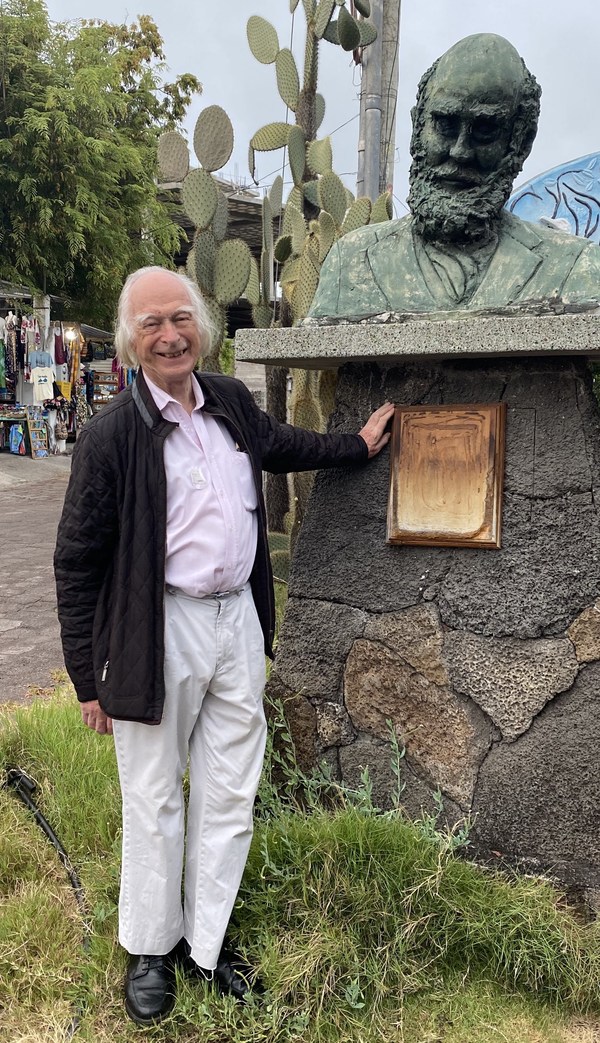Famed Researchers Highlight Glaring Omissions About the Power of Our Cells
Say Modernizing What We Teach About Our Ability To Influence Evolution Can Change How Medicine Is Practiced
OXFORD, England, July 29, 2021 /PRNewswire/ -- Misunderstandings and omissions from Charles Darwin's theory of evolution have spawned massive failures in cancer, antibiotics and nutrition – and it's time to rediscover the real Darwin. That's the view of famed Oxford scientist Denis Noble, creator of the first 3-D model of the heart, longtime author on evolutionary change and scientific advisor to the $10 Million Evolution 2.0 Prize created by biotech company Natural Code LLC.

Noble is challenging long-standing theories that claim evolution is gradual, when studies now show cancer cells evolve in days. "We will never understand cancer until we recognize how tumors adapt on an hourly basis," offers Noble. "But if we show our pre-med students how the human body directs its own evolutions, it will forever transform how they practice medicine."
That's why researchers around the world (including 70 scientists from The Third Way of Evolution), are pressing for significant textbook revisions and long-overdue updates to the foundations of biology. The group is shining a spotlight on two critical areas of education they say are inaccurate:
(1) Darwin's finest insights are wrongly interpreted or overlooked;
(2) 17 transformational discoveries from molecular genetics and genome sequence data are omitted from biology's most used textbook.
They insist up-to-date evolution curriculum is key to rapid breakthroughs for treating disease and curing cancer.
"Students are being taught outdated models," says Noble. "For a century, mainstream science taught fatalism – and insisted we're stuck with whatever genes we inherited from our parents. Today we know our bodies and cells are actually in charge of our own evolution; for instance, athletes transform the way genes express because exercise causes every cell to function differently – and some of this gets passed on across generations.
"The most valuable discoveries are not gene-centric, they are cell- and body-centric, yet we are ignoring this. It matters enormously whether we teach that we're merely passive vehicles for our genes vs. what we now understand – all living organisms are intentional creatures who can alter their genomes when it becomes necessary. It urgently needs rectifying."
More high-profile researchers agree, outdated curriculum has held back biomedical progress. "Scientists like Denis Noble and The Third Way are certainly right in demanding new textbooks on evolution," says Cambridge's Bernhard Strauss, chief editor of the book Rethinking Cancer. "Most books on evolution omit the most important cellular processes that actually drive evolution, particularly rapid adaptation and the ability to generate novel features. Teaching these concepts within Darwin's evolutionary framework will answer many currently unresolved questions in biology. It would also change our understanding of infectious diseases and ecology, and enable innovative approaches to explaining and treating cancer."
A new paper by Noble and a second with University of Chicago microbial geneticist James Shapiro, plus a Voices From Oxford video from Darwin's ancestral home, trace the history of distortions on Darwinism and offer crucial recommendations on how to correct:
Experts insist the science of epigenetics – that behaviors and environment cause changes affecting the way genes work – illustrates how impressive high-speed evolution takes place alongside slower, gradual alterations. "Our life experiences, like responses to stress, impact evolution from one generation to the next," explains John Torday, Professor of Evolutionary Medicine at UCLA. "A smoking grandmother alters the way DNA gets read without changing the genes themselves, and passes asthma to her granddaughter. We need to do a better job teaching this than we currently are."
Physician-scientists at the leading edge of treatment breakthroughs believe there will be significant benefits for diseases like cancer once curricula include contemporary knowledge. "Cancer cells resist radiation and chemotherapy via remarkable built-in evolutionary toolkits," says Columbia University oncologist Azra Raza, author of The First Cell. "They respond to threats at tremendous speed. It's time for textbooks to report this, and for practicing oncologists to factor this into patient treatment protocols."
Noble laments billions spent on the notion genes determine disease and health in a one-way, bottom-up framework in which humans have little control. "Genes are tools, not rigid programs," he adds. "Genes don't run cells any more than USB sticks run computers. This is great news. It gives us greater power over our own health. It's time to acknowledge the purpose and intentionality in our own bodies and through our own cells. It's time to focus on the empowerment that Darwin suspected and science now shows us is true. This is inexplicably missing in our education and training of next-generation scientists and physicians."
"Some of Darwin's finest theories were ignored, stifling breakthroughs for decades. But finally embracing them brings new approaches in so many diseases, perhaps even in generational health since we now suspect things like fetal alcohol syndrome and family trauma are passed down. Getting this rediscovery of history right – a "Darwin 2.0" – is about more than textbooks. Just imagine what happens when we finally tap into the adaptive power of the cell."
Further conversation with Noble can be found here: Denis Noble Q&A
Natural Code is a private Investment group formed to identify a naturally occurring code. Its mission is to discover, develop and commercialize core principles of nature which give rise to information, consciousness and intelligence. Natural Code is sponsor of the largest award in basic science history.
Photo - https://mma.prnasia.com/media2/1583602/natural_code_denis_darwin_galapagos.jpg?p=medium600
PDF - https://mma.prnewswire.com/media/1583603/Natural_Code_popular_evolution_books.pdf